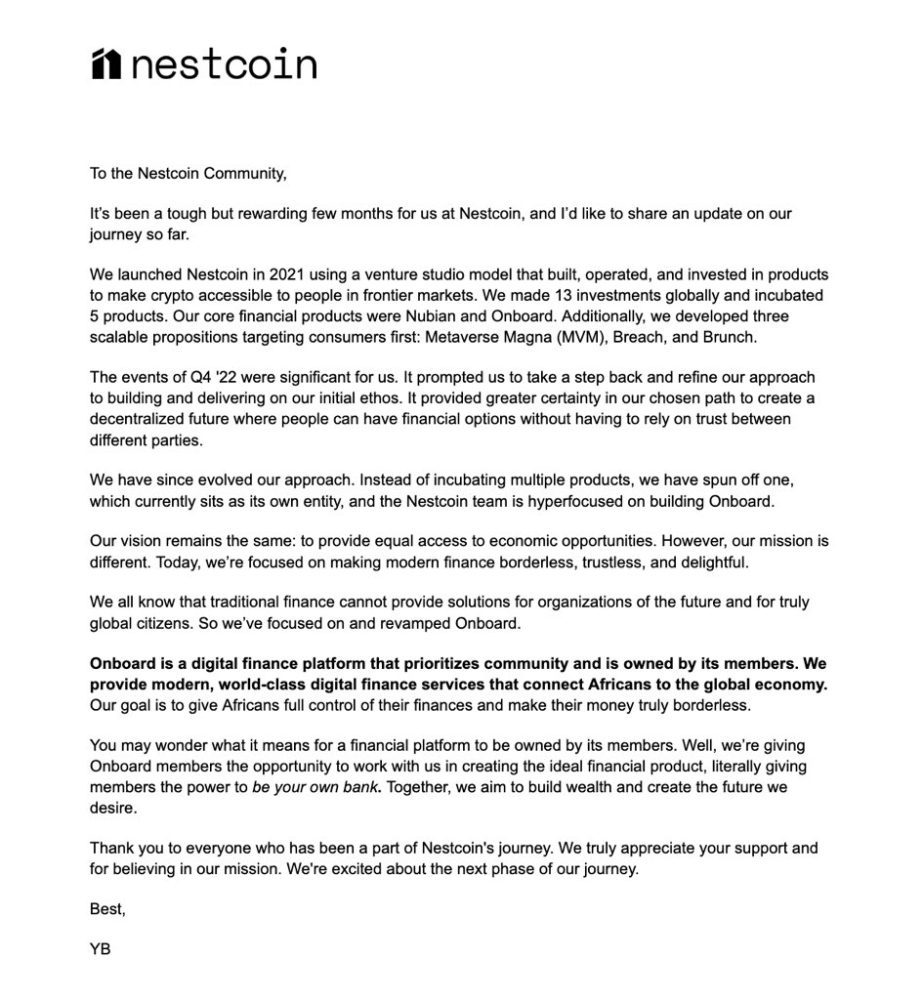African Web3 Startup Nestcoin Plots Curious Comeback After FTX Blow

Nestcoin, the fledgling startup that identifies as an African web3/crypto enterprise, is looking to reinvent itself after a turbulent period. The startup is chasing a new path towards building a novel digital finance platform, according to its Founder/CEO, Yele Bademosi, after facing a period of uncertainty sparked by an upheaval in the crypto industry.
Last November, Bademosi revealed that Nestcoin, which had announced a USD 6.45 M pre-seed months earlier to build, operate and invest in web3 applications in Africa and frontier markets, lost much of its operating capital to the FTX collapse and is laying off staff. This represents some of the effects of the contagion that spread following the dramatic implosion of FTX, which before its fast demise was among the world’s top three crypto exchanges.
At the time, Bademosi shared in a statement that a significant portion of the stablecoin investment it raised, which formed its day-to-day operating budget, was held on FTX. That capital became inaccessible following the extraordinary events surrounding the FTX crash. A subsequent report by FT stated that the sum Nestcoin lost amounted to ~USD 4 M and at least half of its 100-strong workforce was terminated with a view to making adjustments in the hopes of figuring out a path forward.
In his latest statement, Bademosi says Nestcoin, which had previously incubated, operated, and invested in crypto products, is evolving its approach to maintain focus on building Onboard, which it describes as a “digital finance platform that prioritises community and is owned by its members.”

Further details divulged by the CEO, which might come across as rather vague at this point, point to setting up Onboard as a platform that gives members the opportunity to “be your own bank.” Having developed Onboard, the details of which may become clearer as time passes, Nestcoin’s leadership says its new mission is to “make modern finance borderless, trustless, and delightful.
“We all know that traditional finance cannot provide solutions for organisations of the future and for truly global citizens[…] Our goal is to give Africans full control of their finances and make their money truly borderless,” Bademosi wrote in his statement.
Nestcoin, seemingly keen on the audacious, launched in 2021 and set out to make crypto and its opportunities mainstream in Africa through its interests in crypto-gaming, decentralised finance (DeFi), media, and digital art. The company also made investments in a number of startups including Lazerpay which does crypto payments. Bademosi says Nestcoin has made 13 investments globally and incubated five products, including Nubian, Onboard, Metaverse Magna (MVM), Breach, and Brunch.
The startup is backed by several investors (around 19 or so funders) among which are local funds and foreign investors. The latter group include Alameda Research, the sister trading arm of FTX which is strongly implicated in the web of misdeeds that took down the exchange that was valued at USD 39 B before going under. FTX and Alameda also backed a few other African startups, including unicorn Chipper Cash, Bitnob, and Mara.
Bademosi, a former executive at Binance’s venture arm and co-founder of venture funder Microtraction and crypto startup Bundle, maintains that Nestcoin essentially used FTX as a checking account for its operating expenses and that it did not trade. The unravelling of FTX and associated companies have, however, put Nestcoin in a tough spot.
Featured Image Credits: Quartz Africa